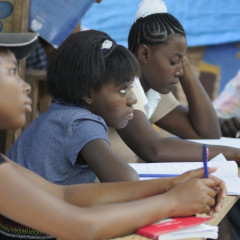The Global Search for Education: Our Top Global Teacher Blogs – What are the top ten ways that administrators can help new teachers avoid burning out?
According to a report from the Alliance for Excellent Education, teacher attrition costs the United States up to $2.2 billion annually. Roughly half a million U.S. teachers either move or leave the profession each year, and tragically, this serious problem disproportionately affects high-poverty schools. It’s essential that we keep every teacher we get. Yet classroom teaching is arguably the most stressful job there is....
The Global Search for Education: Just Imagine – Pak Tee Ng – Singapore
“The annual Clean and Green Singapore Schools’ Carnival encourages students, teachers and partners in education to showcase their projects that protect the environment.” — Pak Tee Ng Just imagine schools decades from today – what will they be like? Pak Tee Ng is Associate Dean, Leadership Learning, and the Head of Policy and Leadership Studies Academic Group at the National Institute of Education (NIE),...
The Global Search for Education: What’s Really Worth Learning?
“I encourage people to tell an ‘opportunity story.’ How might this topic come up later in students’ lives?” — David Perkins Our world is getting increasingly complex; so how do we know what is worth teaching and learning? I watched David Perkins’ presentation on this timely topic at the IB Heads World Conference this year and I am delighted to welcome him today to The Global Search for...
The Global Search for Education: Help Failing Students Improve
“All countries can improve their students’ performance, given the right policies and the will to implement them.” — Andreas Schleicher “Low Performing Students: Why They Fail and How to Help Them Succeed” is a new analysis of previously published PISA data which discusses the factors affecting students’ low performance on PISA together with recommendations for what countries can do to help...
The Global Search for Education: An Interview with Ambassador Kirsti Kauppi
“If we are to achieve the joint goals adopted in the UN in September, they have to be part of everything we do, including education.” — Kirsti Kauppi Finland, a favorite for us here at The Global Search For Education, is renowned for its innovative and progressive thinking when it comes to education. So I was delighted to speak to Kirsti Kauppi, the recently appointed Ambassador of Finland to the United States....






Recent Comments